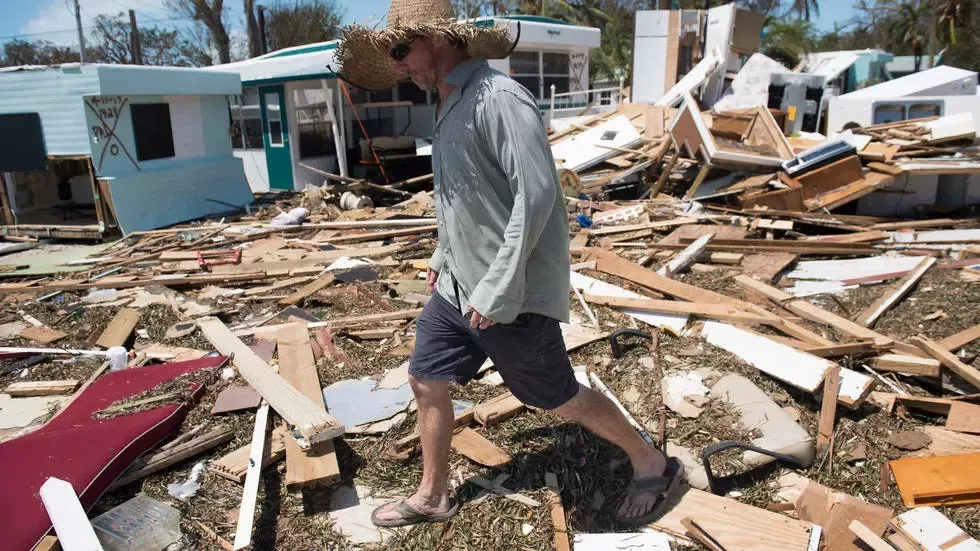Florida's nightmare: a hurricane during the pandemic
Some 17 million Americans lost their jobs due to the nationwide lockdown to stem the spread of the coronavirus
MIAMI: What could be worse than a pandemic overwhelming health care systems and causing global economic collapse? Florida knows the answer: a pandemic that rages into hurricane season, which is already on the horizon and causing the Sunshine State to dramatically update its storm preparations."COVID is bad, a hurricane is bad. If you combine the two, it is greater than the sum," said Bryan Koon, who until 2017 directed the Florida Division of Emergency Management, and who is currently an independent advisor on emergencies.
"The impact of a hurricane during a COVID environment will be worse than either of them even combined. It will be a multiplier effect, not an additive effect," he told AFP.
Turkey hospital sees hope as 93-year-old virus patient discharged
That worst-case scenario is looking increasingly likely.
The United States will certainly still be battling the coronavirus by the time the Atlantic hurricane season begins on June 1, even though storms have hit in the past up to two months earlier than that.
Meteorologists at Colorado University, as well as at Accuweather, are already predicting that this year will see a more active than usual hurricane season, saying that between July and November there could be four major hurricanes sweeping in with winds of more than 110 miles per hour (180 kilometres per hour).
"We're preparing for the worst obviously," said Florida Governor Rick de Santis on Thursday. "Hopefully we don't have to deal with a hurricane. But I think we have to assume that we're going to have one."
Hard decisions
Residents of the state are well versed in what to do when a hurricane threatens: stock up on supplies, board up windows, or evacuate their homes and shops and get out of the way of the storm if it is a bad one.
Those who cannot afford to do so are evacuated in buses and lodged in shelters. When they return home afterwards, they have to deal with the clean-up and repairs.
The question facing Florida's leaders now is how to maintain that strategy of mass evacuation this year, when people are being cautioned to practice social distancing? How will shelters be run in an era of highly infectious deadly disease, when the usual protocol is to put people side by side on cot beds in school gyms?
None of that will be possible this year, experts warn.
"Your friends and your family may not want you at their home because they're trying not to get sick," said Koon. "So bringing in a lot of extra folks may not work."
"Hotels may not be open. Hotels are closing because of low occupancy. I don't know how you're going to open up large shelters, you can't fill a gymnasium with people right now. So that's going to be problematic."
"People are going to have to make hard decisions," he said.
"Would I rather stay here and risk my house with a roof blown off my house or the storm surge flooding out my house? Or would I rather go get in the car and drive somewhere and risk being exposed to COVID-19?"
Rewriting guidelines
Koon, currently vice president for emergency management and homeland security at the crisis consultancy firm IEM, points out that many people will not have the usual funds at their disposal to pay for gas, transport or hotels should they decide to evacuate.
As of Thursday, some 17 million Americans had lost their jobs due to the nationwide lockdown to stem the spread of the coronavirus.
Florida senators Rick Scott and Marco Rubio called on FEMA, the federal emergency agency, to set out a strategy for a hurricane making landfall during the pandemic.
In particular, they asked FEMA chief Peter Gaynor to "take into account how to properly evacuate and shelter those who either have, or are suspected to have, the coronavirus in the event of a storm."
A FEMA spokesperson told AFP that the agency is working with local and state authorities to draw up new guidelines.
The current head of Florida's state emergency management agency, Jared Moskowitz, separately told the Sun Sentinel that he had set up a team to come up with a new response plan.
In 2018, Hurricane Michael, a Category Five storm, flattened the southwestern region of Florida, creating a devastation whose effects are still being felt.
New York health workers hold vigil for colleagues who died in virus fight
The year before that, in 2017, when Hurricane Irma struck, millions of people evacuated their homes in Florida and some 300,000 found refuge in shelters.
And that was just in Florida. In Puerto Rico, Hurricane Maria is estimated to have killed some 3,000 people when it struck in 2017, while last year Hurricane Dorian triggered a humanitarian crisis that the Bahamas still have not recovered from.
"Hope is not the strategy we need right now. We need really dedicated hard planning," said Koon.


COMMENTS
Comments are moderated and generally will be posted if they are on-topic and not abusive.
For more information, please see our Comments FAQ